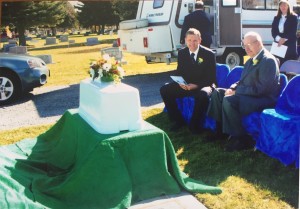
For the Upper Snake River Valley of Southeastern Idaho, the weather was wonderful for this time of year. It was shirtsleeve weather. Back when I lived here, I would have called this an Indian summer. The clear blue sky and warm sun offered the finishing touches to the picturesque scenery of the Rocky Mountains displaying the Teton Peaks. The beauty of it was just one more indication that God was watching over us as we gathered at the Cemetery. No one from our family had ever been buried here, even though our family had called Rexburg home for almost 49 years.
As family began to arrive, most were happily visiting and greeting one another, because some of us had come in from out of town. Many of my nephews and nieces were setting up their musical instruments. Two flutes, two violas, a violin. An electronic Keyboard would serve as the piano. Two of my sisters were standing toward the back, visiting with my mother. I moved about the group and handed out programs.
My dad sat alone in the middle of the front row of chairs which were set up close to the tiny casket. The effects of his cancer had him seeking a place to sit down and rest.
Time seemed to warp for me. At first everything was in slow motion. I stood as if in a trance. The image of my dad facing that tiny white vault which held the original casket burned into my memory. Though his eyes glistened, I wasn’t sure they were tears of sadness. My dad displayed this same face anytime someone in his family really pleased him. It was his proud look. I wanted to know his thoughts. I imagined that his memory had taken him back over fifty years.
His third son (and the older brother I never knew) was spirited and aggressive. He could keep his two older brothers on guard. If the three started fighting for a toy, the brotherly tussle likely ended with the toy in Gary Kent’s hand, and the two older brothers crying.
I studied the pictures on the program once again. Yes, Gary Kent was a happy baby who loved life… until he was 18 months old. Very early in the morning, before doing chores, my dad went into check on him. Gary Kent’s eyes were open; as if he were staring up at the ceiling… his little body was cold… they called it crib death.
My thoughts were now back at the cemetery as my dad stood up and stepped forward. He placed his hand on the casket and held it there. This was another good-bye, fifty years after the first one. Not long after Gary Kent died, my parents had moved. They wanted him close again. That’s why we were here today.
One of my older brothers conducted the short service. Another brother, and myself offered prayers. The sweet music added to the peaceful feeling. I was thankful to be there for the Re-internment. But what I will cherish most from that short visit back home, was what I observed in my dad.
Like everyone who has ever lived, my dad has had his share of trouble and turmoil. He’s made his mistakes and suffered disappointment. But in the face of the storms of life which are billowing on his horizon, my dad is at peace with himself. Since returning back to my own home, and returning to my challenges and turmoil, the image of my father’s serenity shines in my mind. He is like those Teton Mountains which grace his landscape. They stand firm, majestically, as inspiration to anyone who will take the time to look at them. They are the same even if storms are brewing. Even if they are so covered in clouds that no one can see them. My dad is that way. I want to be like that too. More than anytime in my life, I want to be like my Dad.